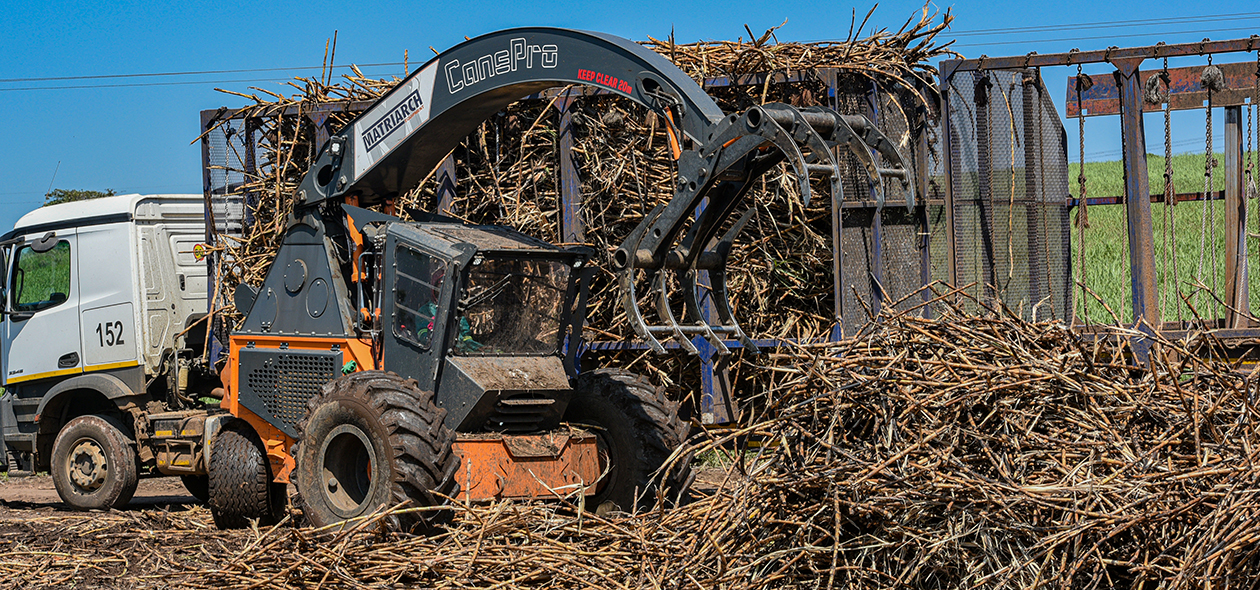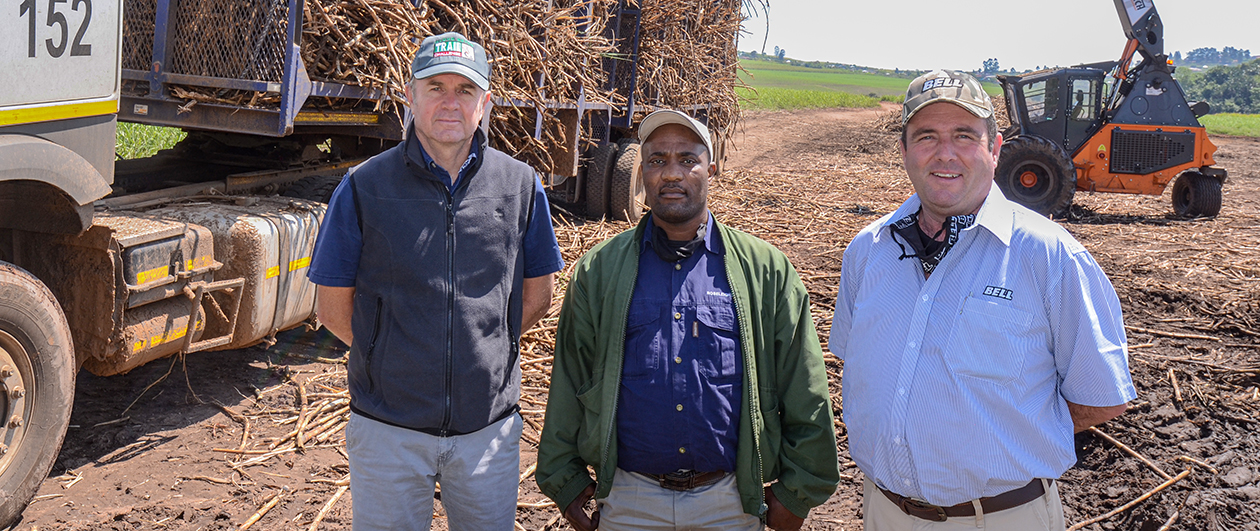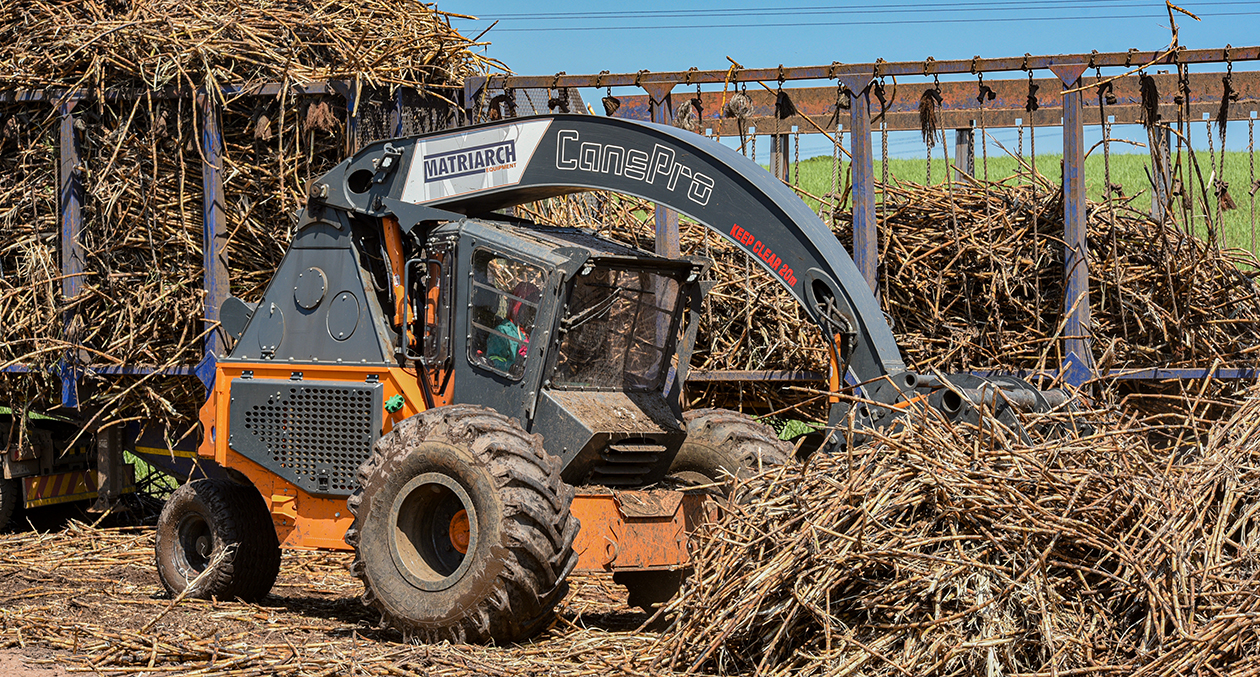Roseleigh Estates achieves in-trailer compaction with CanePro
Published: 24 August 2022

The old saying that time is money rings very true for a KwaZulu-Natal sugarcane grower as a new cane loader drastically cuts loading time while maximising the usable space in a cane trailer.
Rob Gurney’s great-grandfather, Frank Gurney, had been the postmaster in Verulam near Durban and when he retired to a farm under wattle near Eston in 1911, he decided that sugar would be a more profitable crop. His son Eric believed that too and carried on with growing this essential commodity as did Eric’s son Peter, who was Rob’s father. Rob is now the fourth generation farming the land called Roseleigh Estates.
“As far back as I can remember, we’ve had Bell Tri-Wheeler Cane Loaders, going back to the original Bell 100 series with its round-tubed frame,” Rob Gurney says. “We refurbished some of the machines, attending to their engines, wheel motors, pumps and drive trains and respraying the chassis.”
“I know that two particular Bell Cane Loaders ran up 30 000 and 45 000 hours respectively, which is true testament to the machine’s simple but excellent design and quality build that brings about such extreme longevity.”
Roseleigh Estates currently runs a fleet of three Bell Tri-Wheelers – two Cane Loaders, a Bell 125 and a Bell 220, and a Bell 225 Logger. The latter is used in multi-tasking roles for handling some felled wattle, moving seed cane when planting, removing tree stumps and rocks, and handling grass sods for lining water courses to prevent soil erosion. At an average fuel burn of 6 litres an hour, none of these machines are blowing the fuel budget, according to Rob.
Moving with the times and looking for higher yields, Roseleigh Estates started finding that some newer cane varieties at times produced lodged cane, where the stalks are bent, and getting full loads in a trailer became challenging due to the many air pockets the bent cane stalks cause.
“For all their versatility, our Bell Cane Loaders weren’t solving the problem as their booms couldn’t reach down into the trailer to push the lodged cane down and so eliminate air pockets,” Rob explains. “We knew we had to find a solution as with our cane transport business, we get paid per ton of cane that we move and not filling a trailer properly was costing us money.”
Rob thought about using an old 8-ton excavator that would have the reach to push the cane down into the trailer. This excavator would be welded to a trailer for quicker mobility to various loading zones, but this idea was shelved as being impractical.
Rob consulted Keith Milne, Bell Equipment’s knowledgeable sales representative working out of the Bell branch in Pietermaritzburg. “Keith suggested we look at Bell Equipment’s CanePro loader and he duly organised one for us to use on a trial basis for six weeks in the second half of 2020,” Rob says. “During the 500 hours the machine was with us, its performance was remarkable and this prompted us to order one, which arrived in November 2020.
“Our initial motivation for buying the CanePro was to increase the mass of our loads as each of our seven interlinked cane trucks carries just under 1 000 loads per year and each load has to pay for itself,” Rob explains. “By using the CanePro’s longer reach to push the cane down into the trailer, we’ve increased the mass by at least two tons. This adds up to a lot given the annual tonnage each truck carries.”
“However, what we hadn’t banked on and what possibly should have weighed more heavily on our decision to buy the machine was the saving of time we now had loading a truck coupled with more efficient fuel burn while getting bigger loads.”
According to Rob, the CanePro takes 25 minutes to load a truck as opposed to the Bell 125 Cane Loader’s 55 minutes. The CanePro can reach further down into the trailer bin and loads 10,6 tons of cane on one litre of diesel compared to the Bell 125 Cane Loader’s 7 tons. The Matriarch CanePro burns fuel at an average 6 litres an hour.
“Given that a return trip to our nearest mill takes four hours and we do 12 to 13 loads a day, we are now saving up to six hours of loading time. This means that by moving a heavier load of cane more efficiently, we can in fact take one truck out of the system, which at the end of the day means a saving in time, running costs and fuel,” he adds.
Rob and his operators have been impressed by the many safety features the CanePro boasts like the ROPS-FOPS airconditioned cab, a sliding counterweight that adds to the machine’s stability and a fail-safe feature that won’t see the park-brake released unless the cab door is fully closed. This promotes the machine’s safe operation on the steep slopes that characterises Roseleigh Estates.
“I’d like to see Bell incorporate some of these features in its Tri-Wheeler range such as an airconditioned cab (now an option on the F-series) and a sliding counterweight that would increase stability and operator safety,” he says.
Roseleigh Estates’ CanePro is used between 12 loading zones, the furthest being 4km away, and the machine can drive to these zones unaided. It was bought with a standard warranty of 12 months and unlimited hours, and while under warranty all servicing is done by the Bell Equipment mechanics from Pietermaritzburg. The estate’s own mechanic, Vela Ngcobo, reports that Bell Equipment’s response times are very good.
Rob sums up the experience of acquiring the CanePro by saying: “It would be amiss to not mention that Keith Milne had his hand on this entire process, from the time that he arranged a demonstration machine, throughout the manufacturing to the delivery and handover, the latter involving some hands-on training for our operators, which has stood them in good stead and ensured that the CanePro started saving us money almost immediately.”

Owner of Roseleigh Estates, Rob Gurney with his Farm and Transport Manager, Mister Chiya, and Bell Equipment Sales Representative, Keith Milne.

